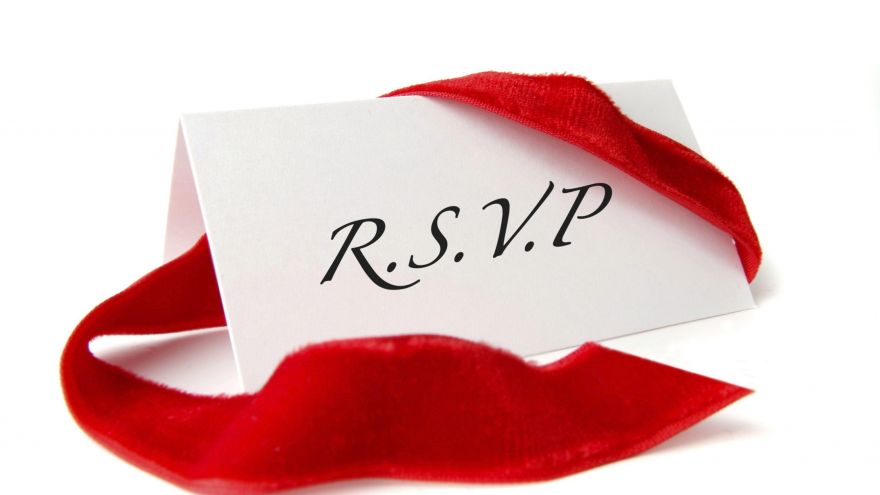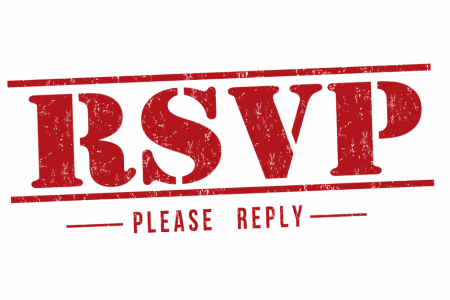RSVP Etiquette: The ABC of RSVP

In the context of social situation, RSVP is the act of response from a guest upon receiving an invitation. The phrase is rooted in French origin and is derived from the beautiful French phrase, Repondez sâil vous plait, or very plainly in our old English, please respond. The phrase is important because the gratuity and planning on the part of the host rests on the receipt of the people invited to attend. Do I cook more apple pie if Penelope and her kids come? Do I need vegetarian options if Ken and his wife attend? How many chairs do we have to fit around the dining table? The response is not just an act of general politeness to show the host your warm thank you for the open-armed invitation, but it is also to inform the host just how much she or he needs to prepare for the event.
Is the old-school RSVP out of style? We don’t see many hand-written cards or mailed invitations to things these days. However, an RSVP invitation is a tidy and functional way to guide an event successfully and with more ease. Millennials use Facebook, Party platform websites, and other forms of media to make RSVP’s a quick and easy task for their guests and to get the hard numbers with one quick click of the mouse and to make available at one quick glance. With the loss of print as a common form of invitation, is the traditional value in RSVP’s also lost in the ever-growing web of technology?
Below you’ll find our RSVP etiquette tips. We don’t think the value has died, as if anything, we need to revive it in how we respond to our generous hosts! Follow the tips below, and you can feel free to add a French accent to your response!
Read the Invitation with Care

Have you ever sat down for an exam or an instructional survey of some sort and read the words, “PLEASE READ THE DIRECTIONS CAREFULLY”? So often we are rushing through instructions or skipping over them entirely that we forget the important details that matter. For any RSVP invitation, take the time to read the invitation, as it will most likely include everything you need to know. If you don’t have time to read the card and anticipate you’ll get distracted by your phone or some other stimulant in your environment, put the invitation in safe place and read it later so you can read and then respond with care and intent.
The invitations often include the 5 W’s: who, what, when, where, and why. Take note of the details and look for the RSVP delivery and the RSVP deadline. What method they ask you to reply in, make sure you do follow the instructions to mold to the RSVP etiquette the host has set up in advance of the event. You don’t want your RSVP getting lost in the mail or somewhere in cyberspace! It may seem easier to pick up the phone and call the host to let him or her know you’re attending or to shoot out a text, but the host has their reasons for setting up the RSVP response the way that he or she did. Convenience is everything. Try to read the invitation and use the RSVP method requested. Be the vehicle of cooperation and the host will be grateful for that.
Be Considerate and Deliver Your Response with Manners
Regardless if you respond yes or no to an event, you must respond with the same respect you’d want to receive from others. Be pleasant and grateful upon response to an event. The RSPVP prompt might simply ask you to check off yes or no and mail the invitation to the host. Or, if the invitation is digital, you might simply reply to the host with one click of a button, which incorporates pleasantry already, like “If NO, click: decline regretfully.”

A personal note or direction message isn’t a bad way to go if you decline! A simple, “thank you so much, I wish I wasn’t on travel that day, or “Next time, I hope to see you soon, thank you,” can go a long way and keep the terms honest and open with the host.
If you are able to attend, check in with the host if you can bring something or pick up party favors before the event. Try to approach the event with an “all hands on deck” mindset. This is a generous gesture of loving energy and respect and can also make the even more meaningful for both you and the host. With the upmost politeness, respond with “accepts with pleasure” or something else that expresses your gratefulness and excitement to attend.
If you do reply yes to the RSVP request, show up! Try and be true to your word. In proper RSVP etiquette, a guest doesn’t miss the party unless it is an emergency or they’ve fallen ill. Although times have changed with the stress of technology and our constant eventful lives, it seems fair to keep your own happiness and stress levels under consideration upon responding.
Respond in a Timely Fashion

Time is of the essence. We are all busy, life happens. Since we are well aware of how busy life can be in waves, show respect to your host by responding within the given time frame on the invitation, or within the week! Hosts are aware of the concept of time in this modern age, and therefore send out invitations well in advance of the event. This is both helpful for you, to plan ahead for the event, and for the host, to have enough time to prepare for the event as guest attendance information continues to roll in. It is important to take note of the RSVP deadline and respond within the time frame. If you do or do not plan to attend, a timely response often can save the host some money and time!
Count All and Any of Your Guests
The more is usually the merrier! Often, there is flexibility in inviting guests to an event if it is communicate in the proper channels and in advance of the event. At more formal gatherings, it might be more difficult to bring extra guests. However, if you ask with the same respect you used in response to the invitation, there might be some wiggle room once the host gets a head count for the party by the deadline.
For the time and money spent on behalf of the host, be upfront if you are bringing guests, and indicate the name of the guest you’re bringing. The host might want names for seating or general self-knowledge. Often time, if you receive an invitation as a couple, the guest count is assumed to be two people per household.
Pin for later

